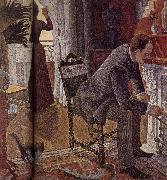
Oil On
Canvas, Real Flavor of Old Masters
|
Paul Signac
|
|||
|
|
|||
| 1863-1935 French Paul Signac Galleries Paul Victor Jules Signac was born in Paris on November 11, 1863. He followed a course of training in architecture before deciding at the age of 18 to pursue a career as a painter. He sailed around the coasts of Europe, painting the landscapes he encountered. He also painted scenes of cities in France in his later years. In 1884 he met Claude Monet and Georges Seurat. He was struck by the systematic working methods of Seurat and by his theory of colours and became Seurat's faithful supporter. Under his influence he abandoned the short brushstrokes of impressionism to experiment with scientifically juxtaposed small dots of pure colour, intended to combine and blend not on the canvas but in the viewer's eye, the defining feature of pointillism. Many of Signac's paintings are of the French coast. He left the capital each summer, to stay in the south of France in the village of Collioure or at St. Tropez, where he bought a house and invited his friends. In March 1889, he visited Vincent van Gogh at Arles. The next year he made a short trip to Italy, seeing Genoa, Florence, and Naples. The Port of Saint-Tropez, oil on canvas, 1901Signac loved sailing and began to travel in 1892, sailing a small boat to almost all the ports of France, to Holland, and around the Mediterranean as far as Constantinople, basing his boat at St. Tropez, which he "discovered". From his various ports of call, Signac brought back vibrant, colourful watercolors, sketched rapidly from nature. From these sketches, he painted large studio canvases that are carefully worked out in small, mosaic-like squares of color, quite different from the tiny, variegated dots previously used by Seurat. Signac himself experimented with various media. As well as oil paintings and watercolours he made etchings, lithographs, and many pen-and-ink sketches composed of small, laborious dots. The neo-impressionists influenced the next generation: Signac inspired Henri Matisse and Andr?? Derain in particular, thus playing a decisive role in the evolution of Fauvism. As president of the Societe des Artistes Ind??pendants from 1908 until his death, Signac encouraged younger artists (he was the first to buy a painting by Matisse) by exhibiting the controversial works of the Fauves and the Cubists. | |||
|
|
|||
|
|
Sunday new11/Paul Signac-583563.jpg Painting ID:: 36951 Visit European Gallery |
mk115 1888-1890 Oil on canvas 150x150cm | |
Height Width |
INS/CM |
||
|
X |
|
||
|
|
|||
|
Andrei Ryabushkin
|
|||
|
|
|||
| (Russian:29 October [O.S. 17 October] 1861 - 10 May [O.S. 27 April] 1904) was a Russian painter. His major works were devoted to life of ordinary Russians of the 17th century. Andrey Petrovich Ryabushkin was born in the village Stanichnaya sloboda, Borisoglebskiy uezd, Tambov gubernia in 1861. His father and brother were icon painters, and he started to help them from his early childhood. At 14 years old he became an orphan. A student of Moscow School of Painting, Sculpture and Architecture A. Kh. Preobrazhensky, who spent the summer in the village, happened to see the boyes drawings and was greatly impressed by them. He started to give him lessons and helped him to enter the Moscow School of Painting, Sculpture and Architecture. Ryabushkin was one of the youngest student of the school at all times. Ryabushkin stayed for seven years (1875-82) in the Moscow School, learning from Vasily Perov and Illarion Pryanishnikov. His first large work Peasant Wedding was bought by Pavel Tretyakov in 1880. After the death of Vasiliy Perov, Ryabushkin moved to Saint Petersburg in 1882, and entered the Imperial Academy of Arts where he learned from Pavel Chistyakov. The classes soon disappointed him, however, and he began to spend more and more time either in the library of the academy or sketching in the streets. His studies at the academy came to an end in 1892. He did not receive an award for his diploma work, Descent from the Cross, as was expected, because he did not follow the approved project. But the work was so good that the president of the academy, Grand Duke Vladimir Konstantinovich, provided Ryabushkin with a stipend for travel and studies abroad from his own means. Instead of going to Italy or Paris, Ryabushkin chose to make a tour of ancient Russian towns (Novgorod, Kiev, Moscow, Uglich, Yaroslavl). The inhabitants of them became his first models and his first critics. | |||
|
|
|||
|
|
Sunday new26/Andrei Ryabushkin-436468.jpg Painting ID:: 96698 Visit European Gallery |
1889. Oil on canvas cyf | |
Height Width |
INS/CM |
||
|
X |
|
||
|
|
|||








